 Leading Blog | Posts by Month |
 Leading Blog | Posts by Month |
09.30.24

LeadershipNow 140: September 2024 Compilation
See more on
Posted by Michael McKinney at 08:10 AM
09.26.24

Leading Thoughts for September 26, 2024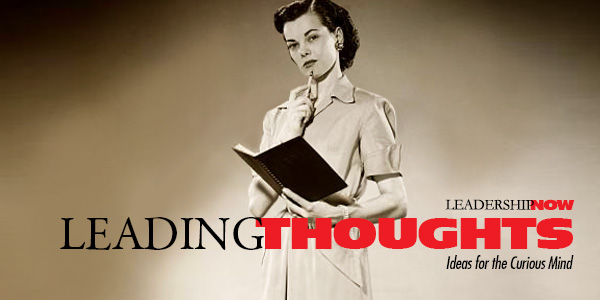
IDEAS shared have the power to expand perspectives, change thinking, and move lives. Here are two ideas for the curious mind to engage with: Kevin Roberts on the future of business: “Even the best teams lose. In business, the best families don’t. A family will beat a team, a tribe, an institution, a community time after time. If you feel like a family and play like a team, your organization will operate at peak performance. I learned this working at Procter & Gamble. Instead of a blame culture, it was all about driving the idea forward together. Source: 64 Shots: Leadership in a Crazy World John Mangieri and Cathy Block on the value of self-knowledge: “These exemplary leaders had excellent self-knowledge, by which we mean clearly defined and well-known attitudes and beliefs. Because they were such open books, there was no reticence on their part to talk or share their ideas and experiences with others. They let subordinates and superiors know what they thought and felt about an issue consideration. They were quickly comfortable in any environment, giving them a real advantage.” Source: Power Thinking: How the Way You Think Can Change the Way You Lead Look for these ideas every Thursday on the Leading Blog. Find more ideas on the LeadingThoughts index.
Posted by Michael McKinney at 10:18 AM
09.25.24

10 Habits of a Peacemaker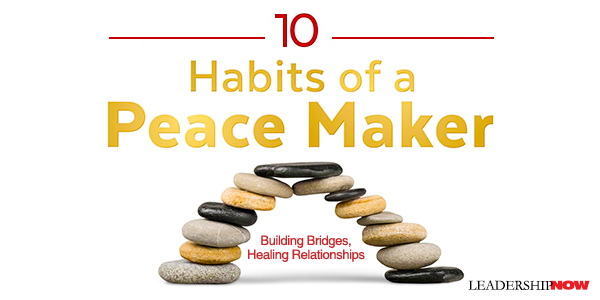
LAW professor Steven Collis is no stranger to polarized arguments. He specializes in the First Amendment. But he has found a way to have constructive discussions without them devolving into shouting matches or accusations. In Habits of a Peacemaker, he provides practical habits and skills to talk about hard topics in a productive way. These habits are more than tactics. They are a way to approach life and see other people. HABIT ONE: Intellectual Humility and Reframing Collis begins where all relationship (leadership) discussions should begin—humility. He states, “Most of us need to recognize that, most of the time, we don’t know what we’re talking about. That may seem offensive, but the sooner we recognize it, the sooner we can open our minds to open our minds to peacemaking and close the door on the kind of contentious behavior that damages relationships.” This is the foundation of all that follows. Judging others creates discord. We should know, too, that when we judge others, we don’t have all of the facts or context. We should take it slow. Conversations must be framed in such a way as to acknowledge the fact that we don’t have all of the information, and the interaction is really about seeking more information and not proving a point. “If someone else brings up the topic in a way that will inevitably lead to fighting, you can move to reframe the issue.” HABIT TWO: Seek Real Learning Building on Habit One, we need to learn from both those around us and from those who have come before us. It means that “we cannot be in a state of constant conflict with either group.” We are all subject to misinformation (really!). We get caught up in catchphrases that circumvent critical thinking. They are often misleading and imprecise, lacking in the intended meaning and nuances. We think we know what they mean by them, but most likely don’t. “It’s entirely probable that both you and the person invoking them place different meanings on them. It’s entirely probable the person invoking them knows exactly what the catchphrase means and has thought long and hard about that meaning. But it’s also likely that a person repeating the catchphrase isn’t sure they know what they mean by it.” Most catchphrases we hear have become an “unsophisticated argument for a sophisticated problem.” We need to diversify our sources of information. Understand the biases coming out of the sources you agree with and those you don’t. It will improve your understanding and knowledge and strengthen your position. And importantly, “Part of seeking real learning is recognizing that whatever conclusion we have reached may be proven wrong as we learn more than we know now.” HABIT THREE: Assume the Best about People Assuming positive intent is assuming the best about people and their intentions. Ask questions. By asking questions, we can better understand others and help them to understand their own views. “In all your inquiries, it’s important to remember why you’re asking questions. Remember: you are not trying to prove a point. You are trying to understand them better so that the two of you can seek ideas and solutions that will speak to both of you.” People act on what they know and understand, which may be very little. “What they have learned about humans is that we tend to reach conclusions based on our gut reactions to any given set of facts, then reason backward to justify conclusions.” We all have insecurities, and we are all subject to confirmation bias. We often project onto other people what we think about them, instead of discovering what they actually think. When we’re dealing with someone who we think is assuming the worst about us, our first step should be to ensure we aren’t just heaping upon them our own insecurities. HABIT FOUR: Don’t Feed People’s Worst Fears Kindness goes a long way and has more constructive powers than sarcasm and anger. Controlling our own emotions is key but not always easy, especially on certain topics that have a powerful hold on us. “The challenge, then, is not to change who you are. It is to reach a point where the topics no longer affect you as much.” Peacemakers are slow to state strong opinions. Listen more than you speak. HABIT FIVE: Hunt for the Best Argument Against You I love this point. Those who disagree with you generally have strong arguments for their position, but by seeking those arguments out “it will force you to better understand, articulate, and defend your own opinions. It may even cause you to—gasp—change your mind.” Peacemakers are not afraid of arguments or facts that challenge their worldview. They seek them out. They analyze them. If arguments or facts make them uncomfortable, they seek to understand why. Seek to learn where you might be wrong. HABIT SIX: Be Open to Change All of these habits come to nothing if you are not willing to consider the need to change your views. “With intellectual humility comes the recognition that there may be more to learn about any topic and that as we learn, our positions may change. Peacemakers do not fear that.” HABIT SEVEN: Spend Time with People The author confesses that he struggles with implementing this on a consistent basis because, as a law professor, he enjoys thinking about some of the hardest topics—constitutional law—of the day. The advice is simple: “Spend time with people doing uplifting things and talking about topics other than the hardest issues of the day.” Considering the delegates that drafted the Constitution of the United States, he observes: “In an environment where hostility could have easily prevented anyone from getting along, the delegates worked well with each other because they were forced to spend time together outside the debating framework. In short, they became friends. It’s hard to hate or discount the people you know well.” We are all on a journey. Key lesson: When we spend time with others and truly get to know them and the circumstances that led them to behave as they do, we tend to be less judgmental of them and more understanding of who they are and why they make the decisions they do. HABIT EIGHT: A Sliver of Humor Humor disarms your listeners. Not everyone finds everything funny. There are different types of humor. Collis lists five. It is important to figure out what kind of humor your audience prefers. Read the room. “While humor can be an effective tool, you must know when it is appropriate. Humor is like social media; use it deliberately, at least in the context of discussions about hard topics.” HABIT NINE: Seek Inner Peace “Peacemakers take the time in their lives to engage in habits that cultivate inner peace, which then permeates outward into the rest of their lives.” You can achieve this through practices like mindfulness, prayer, journaling, and reading. Schedule time to engage in any or a combination of these practices. HABIT TEN: Embrace the Discomfort of Non-Closure Human beings do not like to leave things open-ended. We lean into black-and-white thinking. This kind of thinking can lead us down the wrong path and into toxic discussions. Get comfortable in the gray areas and savoring differences. Obtaining education is not the same as obtaining degrees. True education, not mere degrees, seems to be able to soften our tendency toward dichotomous thinking. It allows us to bask in new information and in new discovery. That said, there are things we can be certain about. But keep in mind, “The decided are always gentle.” That means “there is a calmness and tranquility that comes to us once we have already made up our minds on a particular issue. We need not revisit it again and again every time we face it.” A life rule to follow: “Resolve to behave toward other people with a selfless desire to lift them up regardless of the consequences or who they are.” We can all strive to make other people’s lives better and brighter. 
Posted by Michael McKinney at 12:02 PM
09.19.24

Leading Thoughts for September 19, 2024
IDEAS shared have the power to expand perspectives, change thinking, and move lives. Here are two ideas for the curious mind to engage with: Psychologist Mihaly Csikszentmihalyi on the value of daily surprises: “Try to be surprised by something every day. It could be something you see, hear, or read about. Stop to look at the unusual car parked at the curb, taste the new item on the cafeteria menu, actually listen to your colleague at the office. How is this different from other similar cars, dishes or conversations? What is its essence? Don’t assume that you already know what these things are all about, or that even if you knew them, they wouldn’t matter anyway. Experience this one thing for what it is, not what you think it is. Be open to what the world is telling you. Life is nothing more than a stream of experiences — the more widely and deeply you swim in it, the richer your life will be.” Source: Creativity: Flow and the Psychology of Discovery and Invention T.D. Jakes on personal responsibility: “We are born looking like our parents, but we die looking like our decisions.” Source: Disruptive Thinking: A Daring Strategy to Change How We Live, Lead, and Love Look for these ideas every Thursday on the Leading Blog. Find more ideas on the LeadingThoughts index.
Posted by Michael McKinney at 08:42 AM
09.13.24

Dynamic Drive: The 7 Keys to Sustainable Success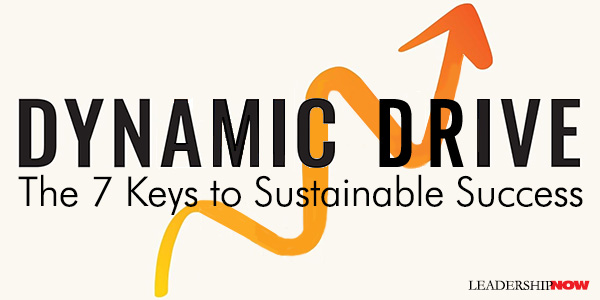
THERE is drive, and then there is Dynamic Drive. Dynamic Drive is about aligning what you do with who you are. Author Molly Fletcher says, “It’s about figuring out whether there are parts of your life where you are playing small or safe or are dissatisfied.” It’s about fulfillment. Dynamic Drive is about the journey. It’s about becoming. “Dynamic Drive is the process by which we implement and sustain intentional change. It’s a belief system that the ‘yeses’ will come if we stay the course, and the ‘nos’ along the way are just feedback.” To begin, you need a sense of who you want to become. It is your purpose. It’s what keeps you going when motivation fails you. Complacency is the enemy of drive. “Complacency is a feeling of self-satisfaction that keeps you from reaching your potential.” Success can lead to complacency, but you can’t remain in that state if you are to reach your potential. “Complacency happens when you don’t recognize that you’re stuck or you aren’t willing to do anything about it.” In a state of complacency, you miss the gaps between where you are and where you want to be. You’re compromised and on autopilot. You have to make a move. “Change is hard; it’s uncomfortable, particularly when you have been in a current state for a long time.” Dynamic Drive is the process Fletcher created by which we implement and sustain intentional change. It’s not about achievement. It’s about what you become in the process. “If the sole focus is achievement, what comes next are dark, empty, lonely moments.” There are seven keys to using the power of Dynamic Drive for sustainable success. First Key: Mindset The mindset she describes is a possibility mindset. A mindset that serves your purpose. “You are the narrator of your life story. The old story is usually tied to something that’s holding you back. The way you’re talking to yourself isn’t serving you. What you tell yourself matters, and it’s time to take control of that messaging.” Second Key: Energy Be intentional about how you spend your time. “You must have the guts to ditch the things that don’t bring meaning to our priorities in life. Invest more time in the things that sustain and replenish your energy and eliminate or better manage those things that drain your energy.” Third Key: Discipline Discipline is the bridge that takes you to your goals. “The bridge is the daily grind, the behaviors and habits that get you to your goals.” Take the long view and be intentional about every action you take. Fourth Key: Curiosity Curiosity leads to learning, and learning leads to growth. Curiosity that leads to action is the edge you need for sustainability. Curiosity “unlocks new opportunities and strengthens connections. A mixture of confidence and vulnerability is necessary to be curious. It takes both to acknowledge that you don’t have all of the answers.” Fifth Key: Resilience “Resilience is the ‘capacity of a system, enterprise or person to maintain its core purpose and integrity in the face of dramatically changed circumstances.’ Resilience is built through action. You can’t think your way into it; you have to do it.” It is important to understand, too, that “it’s inevitable that your Dynamic Drive will be interrupted—that’s what makes it dynamic. Resilience is the key to embracing the unexpected hiccup as just that, and not the decline of your Dynamic Drive.” Sixth Key: Connection Connections are built through conversations and time spent with others. Building a culture of support will help you to sustain success and maximize your impact through the success of others. Build relationships that amplify your Dynamic Drive. “Positive and ambitious friends and colleagues can inspire us to grow, learn, and push ourselves outside of our comfort zones. They introduce us to new opportunities or experiences we might not have considered on our own. Close friends often provide emotional support and encouragement.” Seventh Key: Confidence Confidence is the belief in your abilities. Confidence wanes at times. If it doesn’t, you probably aren’t pushing yourself as you need to. It doesn’t come from your comfort zone. Confidence comes through actions that push you. “Confidence helps you take action, and the more action you take, the more confident you become.” Discovering your purpose takes time and can change through the seasons of your life. “Purpose is something that you can uncover through doing, through action, and through showing up. Get clear on direction, do the work of reflection, and then take it out to the streets. You’ll continue to refine it. You’re molding it constantly. Putting yourself out there, even in less-than-ideal circumstances, allows you to learn about your purpose and to dig deeper into how it feels as you’re engaging it. You’ll see the gifts and benefits of a clear purpose when you start to live into it. 
Posted by Michael McKinney at 03:57 PM
09.12.24

Leading Thoughts for September 12, 2024
IDEAS shared have the power to expand perspectives, change thinking, and move lives. Here are two ideas for the curious mind to engage with: Harvard Professor Paul Lawrence on making morally significant choices: “It is as much within our power to make choices that lead to the destruction of species as it is to make choices which keep us on the track of continued life and development. Source: Driven to Lead: Good, Bad, and Misguided Leadership Art Horn on judgmentalism: “Paradoxically, one of the chief tasks of leaders is to judge without being judgmental. Source: Beyond Ego: Influential Leadership Starts Within Look for these ideas every Thursday on the Leading Blog. Find more ideas on the LeadingThoughts index.
Posted by Michael McKinney at 12:57 PM
09.05.24

Leading Thoughts for September 5, 2024
IDEAS shared have the power to expand perspectives, change thinking, and move lives. Here are two ideas for the curious mind to engage with: Inky Johnson on burnout: “People don’t burn out because of what they do. People burn out because life makes them forget why they do it. Meaning life hits and hits them with something until they just like, “Man if I’ve got to go through that, I’m not bringing it today, man.” And every day is not a good day. Everything is not all peaches and cream. But that’s why the culture is so important. That’s why when the culture is set, we know what we bring to it, and we know how we get down because we know what we’re working for. And the purpose of it is greater than any individual.” Source: VIDEO: Control the Controllables Molly Fletcher stressing that drive is internal: “When we focus on the opponent instead of running our own race, we allow the measuring stick to be our competition instead of ourselves. We are distracted by something uncontrollable. Source: Dynamic Drive: The Purpose-Fueled Formula for Sustainable Success Look for these ideas every Thursday on the Leading Blog. Find more ideas on the LeadingThoughts index.
Posted by Michael McKinney at 02:33 PM
09.01.24

First Look: Leadership Books for September 2024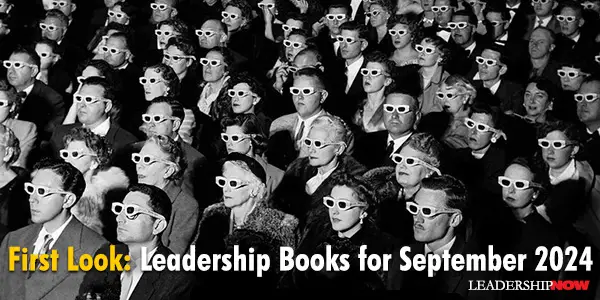
HERE'S A LOOK at some of the best leadership books to be released in September 2024 curated just for you. Be sure to check out the other great titles being offered this month.
This isn’t just another self-help theory: Dynamic Drive is your practical guide to unlocking your true potential. Through her decades of experience working with top athletes and peak performers across industries, renowned keynote speaker and leadership expert Molly Fletcher has created a proven formula backed by research that outlines the seven keys to sustainable success. The truth is fulfillment doesn’t come from setting and accomplishing goals in isolation. It comes from Dynamic Drive—a holistic approach that connects all parts of you with your purpose and allows you to engage in meaningful growth, both personally and professionally.
In The Upside of Disruption renowned disruption thinker and best-selling author Terence Mauri delivers a compelling set of mindset shifts for today's unique leadership challenges. In the book, you'll find the future-ready insights and tools you need to lead for today and prepare your organization for tomorrow. The author explains why so many of us continually overestimate the risks of bold decisions while underestimating the downsides of standing still for too long in an increasingly complex and volatile world. You'll learn about the upside of disruption and how to turn it into a tailwind for laser-like focus and strategic courage.
When the pressure is on, many of the world’s top CEOs turn to McKinsey & Company to reinvent themselves and their organizations. The Journey of Leadership brings the experience of one of the world’s most influential consulting firms right to your fingertips. This book is the first-ever explanation of McKinsey’s step-by-step approach to transforming leaders both professionally and personally, including revealing lessons from its legendary CEO leadership program, The Bower Forum, which has counseled more than five hundred global CEOs over the past decade. It is a journey that helps leaders hone the psychological, emotional, and, ultimately, human attributes that result in success in today’s most demanding top job.
Most people have experienced the slippery slope of dialogue that descends into -polarized argument. We yell at each other. We gaslight. We twist one -another’s words and meanings. We embrace facts that support our conclusions and ignore those that don’t. Or we sit in silence, afraid to discuss anything of substance. If how you treat others matters to you, this book offers powerful new habits that can give you the confidence to engage in dialogue about hard topics while building and strengthening relationships. Steven T. Collis, one of the world’s leading experts on civil -discourse, reveals ten practical habits that can help you navigate the potential minefields of hard topics and leave you and those you converse with feeling thoughtful and productive.
Learn the foolproof framework to take back control and create immediate and lasting change. Getting stuck in life is a guarantee. Staying stuck is a choice. In The Art of Changing Course, amputee, diabetic record-holding powerlifter, and renowned motivational speaker and author Chris Ruden provides a clear-cut process that walks readers through digestible, actionable stages to get unstuck, allowing you to rise beyond simple awareness of the desire to change and become the person you truly want to be. Backed by numerous psychological principles, management techniques, and organizational change theories, The Art of Changing Course focuses on helping readers make three distinct shifts: from subconscious to conscious, conscious to communicated, and finally, communicated to broadcasted.
Generative AI and the remote-work revolution show us every day that we're in a new era. The rules and norms have changed—and so must leadership. And yet, coercive bureaucracy, hierarchy, and control—old ways of thinking and working—are still with us, a deep-seated and powerful legacy. We are living through a profound transition from an old, industrial era to a new one that is digital, transparent, and complex. In this important new book by former dean of Harvard Business School Kim Clark, written with his business school professor son, Jonathan, and management consultant daughter, Erin, the dynamic struggle between two competing paradigms of leadership is compellingly illustrated: an old paradigm that involves control and power over people versus a new one that enables and inspires power through people.
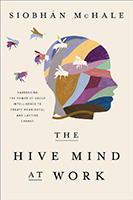 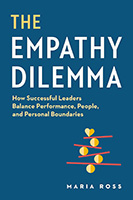 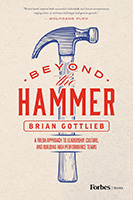 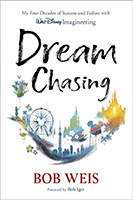
“You can't think well without writing well, and you can't write well without reading well. And I mean that last "well" in both senses. You have to be good at reading, and read good things.” — Paul Graham, Y Combinator co-founder
Posted by Michael McKinney at 09:55 AM
|
BUILD YOUR KNOWLEDGE


How to Do Your Start-Up Right STRAIGHT TALK FOR START-UPS 
Grow Your Leadership Skills NEW AND UPCOMING LEADERSHIP BOOKS 
Leadership Minute BITE-SIZE CONCEPTS YOU CAN CHEW ON 
Classic Leadership Books BOOKS TO READ BEFORE YOU LEAD |
|